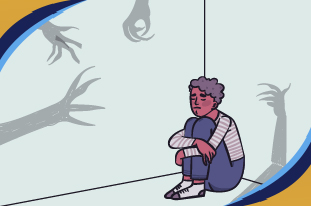Most babies have an abundance of energy, and that’s well and good. They can even cry a lot but that’s normal too. But did you know that these outbursts of crying and tantrums are better predictors of ADHD rather than hyperactivity? So the real question is, are these meltdowns and tantrums early signs of ADHD in babies? That’s what we are here to discuss today. If you are concerned about if symptoms like these are indicating your toddler might have ADHD then we are here to help you eliminate these concerns fully. Let’s begin with the words below before we also dwell on ADHD symptoms in toddlers.
Defining ADHD
Before we go into the discussion of ADHD in babies, we need to focus on ADHD initially. Attention-deficit/hyperactivity disorder, which is abbreviated as ADHD, is a neurodevelopmental condition that predominantly affects children, from as early as the age of 2 or 3 years of age. Symptoms of ADHD include inattention (not being able to keep the focus on one thing or task), hyperactivity (excess movement that is not fitting to the setting or mood), and impulsivity (hasty and spontaneous acts that occur at the moment without any thought process), which are highly capable of hurting the day to day functioning of the affected individual, which in the case of the topic, happens to be under the age of 4. Around 4% and 12% of children have ADHD and it’s way more likely to be seen in boys than girls (Attention-Deficit / Hyperactivity Disorder (ADHD) in Children, n.d.). So how can parents and practitioners identify ADHD in babies’ red flags? That forms the point of discussion in the next section!
Read More: Let’s Talk About The Relationship Between ADHD and Anxiety
ADHD in Babies
While we always knew about ADHD in children that there is the possibility of ADHD in babies kind of blows my mind. ADHD babies are not easily recognizable as many toddlers tend to throw tantrums and have meltdowns of the slightest of hiccups but these are also reigning symptoms that help us identify ADHD in babies such as yours really exists. These symptoms are what make a diagnosis at that point of their lives, so much more tricky as many do go on to find out that they have ADHD in their later years. It is always so much better to have the diagnosis from the get-go as it is not something as simple as anxiety.
Earlier Signs of ADHD in Babies
As per the American Academy of Pediatrics (AAP), usually, children who are around at least the age of 4 are diagnosed with ADHD. This does not at all mean that ADHD symptoms in toddlers are not a real phenomenon (Wolraich et al., 2011). The thing is, it essentially is a real deal. Let’s take a look at a table (Buzanko, 2025) on how the difference in ADHD symptoms in toddlers can help us differentiate them from babies with normal neurodevelopmental (neurotypical) brains.
| Behavior | Neurotypical | Possible ADHD |
| Tantrums | 2-3 times/week for less than 15 minutes; frequency and intensity lessens over 6 months | 3+/week for more than 15 minutes at a time; frequency and intensity persist for 6 or more months |
| Aggressive behaviors (e.g., biting) | 1-2 times a month (between 12-36 months) and/or with little expressive language | 36+ months, occurring more than once or twice (i.e., often during tantrums), and/or possessing good language skills |
| Self-injury (e.g., bite or hit self, head-banging) | Not applicable | Occurs at any time |
If you look at the table above, you will notice the differences. One noticeable one is that the symptoms where ADHD seems plausible have extended time periods. In addition to that, there is also a probability of self-injury if you think your baby is one of the ADHD babies. Affected babies are also the ones who are extremely active and spontaneous and seem to need less sleep than their peers. All of this makes it possible to even induce ADHD in a 1 year old baby.
Read More: Let’s Discuss Ring of Fire ADHD
Causes of ADHD in Children (And Toddlers)
As in older children and adults, there is no single cause behind the diagnosis of ADHD in babies. When it comes to causes of ADHD in children, there’s usually a multitude of factors at play, which makes the diagnosis of ADHD in kids and babies, a reality. Let’s see what are these (Causes of ADHD: What We Know Today, n.d.):
Genetics
ADHD is a genetic and hereditary condition. It means if there is a family history (genetic disposition) and one of the other factors comes true (an environment where the genetic disposition comes into motion) then it is likely that your baby is going to have it.
Brain Functionality
How your brain functions also contributes to the existence of ADHD. People who have ADHD tend to have disparities in the areas of the brain that control attention and focus, especially when their brain mapping is compared to that of neurotypical brains.
Read More: Child Psychiatrist – A Guide For Parents & Guardians
Presence of Lead and Other Toxins
While it is rare, lead and other toxins like it can find their way to your child from the environment. Lead especially, can cause ADHD in babies and children of older age.

Issues at the Prenatal Stage and Premature Birth
If any of the parents were dwelling in self-destructive behaviors such as drinking alcohol or abusing recreational substances, especially if these people were mothers at the prenatal stage, it had led to ADHD in babies and therefore, obviously signs of ADHD in toddlers. Likewise, premature births have often led to ADHD diagnoses later in life.
Critical Injury to the Head
If your baby or child suffered a critical head injury, there is a more prominent likelihood of an ADHD diagnosis in them.
Duly note that food allergies, food dyes, and sugar are not known to cause ADHD as per the AAP.
Read More: Bipolar Disorder Vs ADHD: Learn The Symptoms
Treating ADHD in Babies
To diagnose ADHD in babies and children, they have to be monitored. This is because babies and children due to the sheer differences in symptoms (when compared to adults) and the difficulty of diagnosing them (because they tend to always be in motion), it’s rather easier to monitor them directly. After careful monitoring, an expert ensures if there is ADHD in babies or in children or not and then a treatment plan is devised accordingly, most of the time involving:
- Complementary support for parents helps create an environment that caters to their child’s needs.
- Psychostimulant medications (e.g., Ritalin, Adderall, and Dexedrine), are highly effective at treating ADHD. Use these in such a way that children can take them but do remember that babies should not be prescribed these medicines.
- An academic setting that encourages children and babies who have ADHD to learn properly.
Read More: ADHD vs Depression: Finding The Link Between Them
Conclusion
Now you know ADHD in babies is actually a thing and you also know the symptoms of ADHD in toddlers, in addition to what it does to children. It’s not the time to ask questions like, “Can babies have ADHD?”. Now it’s time to get treatment for it, say for example, through psychotherapy or medication management. You can get it at Orange Coast Psychiatry as they are adept at treating issues like ADHD and even others such as depression in adults. Let’s make an appointment.
























